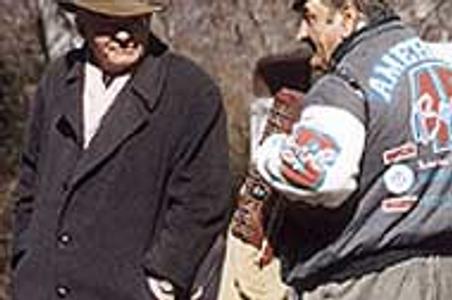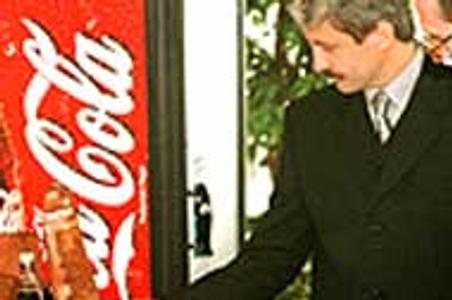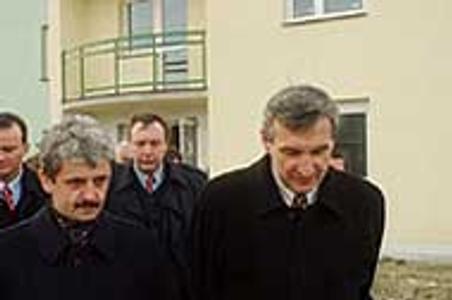Archive of articles - May 2000, page 4
If you desire to read an old article, use the search bar or select the publication date.
Slovaks slow to buy complete coverage
While many industries and services in Slovakia currently find themselves being overhauled to fit into the western business mold and get ready to compete with foreign firms, the insurance sector stands on relatively stable ground.Representatives of the companies themselves have said that Slovak insurance practices are on par with those in the West, although the Slovak market itself retains a conservativism rooted in a struggling economy and hangovers from a command market.The insurance sector is dominated by Slovenská poisťovňa - a firm which now holds monopoly control in auto insurance - and a host of foreign entities that seized on post-Velvet Revolution opportunities when the country moved to a free-market economy in 1989.
Corporate culture a vital tool
The business environment that defines the conditions under which many of today's companies operate can be described as global, cross-cultural, and highly competitive. In a very simplistic way, the adjectives in the previous sentence can be rephrased by the words such as unstable, changing, and in many respects unpredictable.In this environment firms have to adjust in order to survive. It requires them to better utilise their resources in order to be efficient and competitive. It is the environment that puts organisations under pressure, but that does not mean that the same organisations need to play a passive, reactive role.
Gazing into the privatisation crystal ball
In a country that has been lambasted for the slow pace of its privatisation, setting a date for the end of the monopoly of Slovenská poisťovňa on the Slovak insurance market, in two forms of insurance at least, is a welcome signal to investors.Of course, dates for privatisations may come and go, be missed, as unforeseen perils along the path of the government sale emerge to waylay the state in its attempts to off-load its stake in a firm. The government's laggardly approach to structural reform, especially in the banking sector, has already caught the eye of those abroad willing, if not yet wholly committed, to put money into Slovakia.However, the sale of SP will be a bit different from that of other state-controlled firms, even if the exact set date for the sale is not kept.
Business Briefs
IMF issues warning over fiscal disciplineVÚB has Q1 profit of 261 million crownsNafta profit at 163.17 million crowns for Q1Balance of payments drops 4 billion crownsNumber of people on social benefits up to 310,700 in Q1Ministry says new ST shareholder would hinder saleEuropean firms express interest in SPP utility
Review: Jazz comes out of hiding
With techno and pop music dominating Slovak radiowaves, and classical ensembles and cover bands almost the only live music options around town, one may be led to believe that jazz has no place on the Slovak music scene.But while the art form may not be thriving, if one looks hard enough a few purveyors of the style can be found in local nooks and crannies. One group doing jazz proud for the Slovak crowd is the Vlado Vizár Jazz Quartet, whose musical prowess and upbeat take on the genre can get even the most timid of wallflowers tapping their feet and clapping along.
MPs biting nails over pension reform
Reform of the pension system in Slovakia is one of the most complex and politically sensitive programmes the government is facing in the near future. Its difficulty is borne out by the fact that no government since 1990 has managed to put pension reforms into practice.After the political and economic changes in 1989, politicians realised that the old pension system (also called "pay as you go"), based on the principle of a fund storing pension contributions that are drawn from the monthly salary of people and then used to cover retired peoples' pensions, would not be sufficient to cover these pensions in the future.Business sector decline and an increase in the unemployment rate during the last nine years has confirmed that a one pillar pension system can only last for a few more years, making the deficit of Sociálna poisťovňa (SP) - the institution in charge of collecting pension contributions - even higher.
Letters to the editor
Roma politically, not factually correctAn end to fliesInternational marriages worth the shockShareholders must bear responsibilityForeigners even need protection from police
News Briefs
Czech senate ratifies treaty on federal assetsFigeľ in Holland to debate Roma asylum seekersDÚ vice-chairmen Budaj and Švec resignMP Sládeček's immunity should be lifted: CommitteeSTV management concerned about lobby groups
New tax incentives ignore local firms
Domestic firms have been left in the lurch after what had promised to be a move to put them on a level playing field with foreign investors was rejected by the government at a session May 10. The cabinet had been expected to approve a new tax incentive plan for investors that would have improved conditions for foreign companies and given some tax holidays to domestic firms.Government representatives said after the decision that they had taken the move in light of the current squeeze on the revenue side of the state budget, and had shied away from a plan that would have seen a large dip in cash inflows from corporate tax.
LCD displays... and what next?
Everybody who takes any interest in computing technology understands that the long and fruitful era of classical CRT monitors is slowly coming to its inevitable end.Today we can see a growing number of so-called LCD monitors with various sizes in a growing number of companies and workplaces. Not many of us have contemplated whether LCD technology is going to dominate the market for as long as its CRT predecessors, but even now there is a newer technology on the scene - polymer displays.These new "display areas" are no longer classical screens. Imagine your text editor lying directly on the table, where you can work with it interactively, or a display mounted on the wall, with supreme parameters but only a few millimetres thick.
Restaurants
ArkádiaČervený RakMária TeréziaModrá guľaParlamentkaPrašná BaštaPrešporská kúriaRybársky cech
Project coordination often at fault
At the end of February this year my column discussed the ways in which a lack of coordination in project information leads to lost time and cost increases.In this and my next column I will focus more closely on minimising cost and time overruns through effective project co-ordination.In many instances the major contributory factor to contractual problems is the poor quality of project documentation, i.e. drawings, specifications and in some cases schedules of quantities caused by a lack of co-ordination between the architect, engineers and cost consultant and their respective documentation packages. Thorough pre-planning can minimise the problem.
Culture Shock: Costa Rican fauna tell Slovak tales
After three weeks of sleeping and boozing in Costa Rica, blissfully beyond the reach of any news, I'm finding it difficult to recover the mental agility needed to cope with Slovakia and its turbulent politics. But I'm also beginning to realise that this same turbulence is what makes the country so attractive to jaded foreigners. The fact that Slovaks are still struggling to answer major social questions gives life here an edge and a crispness it lacks in many older countries.Take last month's headlines, for instance - a Slovak SWAT team blows the door off the former prime minister's residence with dynamite and escorts the smirking recluse to Bratislava, where he again refuses to testify in a kidnapping case whose ringleader has said the ex-PM was the "spiritual father" of the crime.
News Briefs
Lengyel quits as prime minister's spokesmanSecurity cameras to improve city safetyUkraine requires visas for Slovaks as payback
Bratislava Mayor Jozef Moravčík: City metro ready by 2004?
Former Slovak Prime Minister and now Bratislava Mayor Jozef Moravčík has his hands full. Overseeing and trying to get off the ground new projects such as construction of a metro for the capital, a new business centre and the reconstruction of the old town are part of his everyday work. Having lived in Bratislava for 30 years, Moravčík wants to solve the problems that his fellow Bratislavans face every day.The Slovak Spectator sat down with the mayor on April 19 to discuss the city's development plans at the beginning of the new millennium.
New Faces/Departures
On April 29, publisher Rick Zedník worked his last day at The Slovak Spectator, a paper he co-founded in March 1995. Rick, 28, is getting married this month in Montreal, and then will spend the summer travelling before moving to Boston in the fall. He remains a shareholder of the paper.Rick's responsibilities for managing the company pass to Tom Nicholson, 33, who in addition to being editor in chief as of May 1 will serve as director.The Slovak Spectator welcomes to its staff Matthew Reynolds, 23, a native of Lyons, New York. Matthew, who has been teaching English in Slovakia and contributing to the newspaper as a freelancer for over a year, will be writing for the culture section. He holds a degree in Labour Relations from Cornell University, and devotes his free time to studying Slovak.
Surfing the real estate web
There is no doubt that the Internet has became a part of our everyday life whether you use it at home or you need it for your work or it is just a hobby, used for surfing the web.A lot of companies have their own web page and it is just a question of time before business via the Internet will take off. But that has already started in a small way with commerce using the internet increasingly popular and in future possibly replacing ordinary shopping in stores.As the real estate business is a very attractive branch of enterprise the Internet just could not pass it by. If you are interested in buying or renting a property you can simply click on a www server and take a look at millions of homes and apartments on offer.
B2B market on your desktop
As more and more people start to use their home PCs to buy online, they are discovering that it entails nothing more complex than going to a website, browsing for the desired product, and then keying in credit card and address details to complete the transaction. The B2C (business-to-consumer) revolution is well and truly established.But what if it was this easy to do substantial commercial and industrial B2B (business-to-business) trading? What if corporate buyers could search for and buy products from suppliers they had never traded with before? Or if new suppliers could sell products to corporate buyers around the globe? With the advent of a new online model of trading called an Exchange, it can be that simple.
- Top 10 events in Bratislava for foreigners
- Slovakia loses another EV model to Spain as Stellantis chooses Zaragoza over Trnava
- News digest: Prosecutor seeks jail for NBS Governor Kažimír as his political support wanes
- No more photos or bank statements? Slovakia moves to ease residence process
- Weekend: Celebration of fun comes to Malacky Photo
- Slovak female triathlete shatters barriers with historic win at Himalayan event
- Convicted of multiple murders, Slovakia’s mafia boss seeks release from prison
- 3 free things to do in Bratislava in the next seven days
- Weekend: Celebration of fun comes to Malacky Photo
- No more photos or bank statements? Slovakia moves to ease residence process
- Top 10 events in Bratislava for foreigners
- Slovakia loses another EV model to Spain as Stellantis chooses Zaragoza over Trnava
- News digest: Fico’s bloc wants to save money by restricting electoral access
- Maria Theresa on the banks of Bratislava
- 3 free things to do in Bratislava in the next seven days
- News digest: Prosecutor seeks jail for NBS Governor Kažimír as his political support wanes
- Maria Theresa on the banks of Bratislava
- No more photos or bank statements? Slovakia moves to ease residence process
- 3 free things to do in Bratislava in the next seven days
- Weekend: Celebration of fun comes to Malacky Photo
- Top 10 events in Bratislava for foreigners
- News digest: Violent gang in Bratislava is under arrest
- Digital Jarvis is real now. He is coming for your to-do list
- The Kremlin’s security agency has a Russian contractor in Slovakia - no one has noticed
- Maria Theresa on the banks of Bratislava
- No more photos or bank statements? Slovakia moves to ease residence process
- A mayor resigns over €2.7 million fraud scandal at town hall
- He designed Gatwick. But this is his masterpiece
- Fico praises China and Vietnam as models, says liberal democracy has failed
- News digest: Violent gang in Bratislava is under arrest
- The compass points to Kúty, and people are starting to follow
- The Kremlin’s security agency has a Russian contractor in Slovakia - no one has noticed
- News digest: Prosecutor seeks jail for NBS Governor Kažimír as his political support wanes
- Slovakia loses another EV model to Spain as Stellantis chooses Zaragoza over Trnava
- Slovak female triathlete shatters barriers with historic win at Himalayan event
- Weekend: Celebration of fun comes to Malacky Photo
- News digest: Fico’s bloc wants to save money by restricting electoral access
- Slovakia plans to restrict access to new medicines amid funding shortfall
- No more photos or bank statements? Slovakia moves to ease residence process
- Top 10 events in Bratislava for foreigners More articles ›






